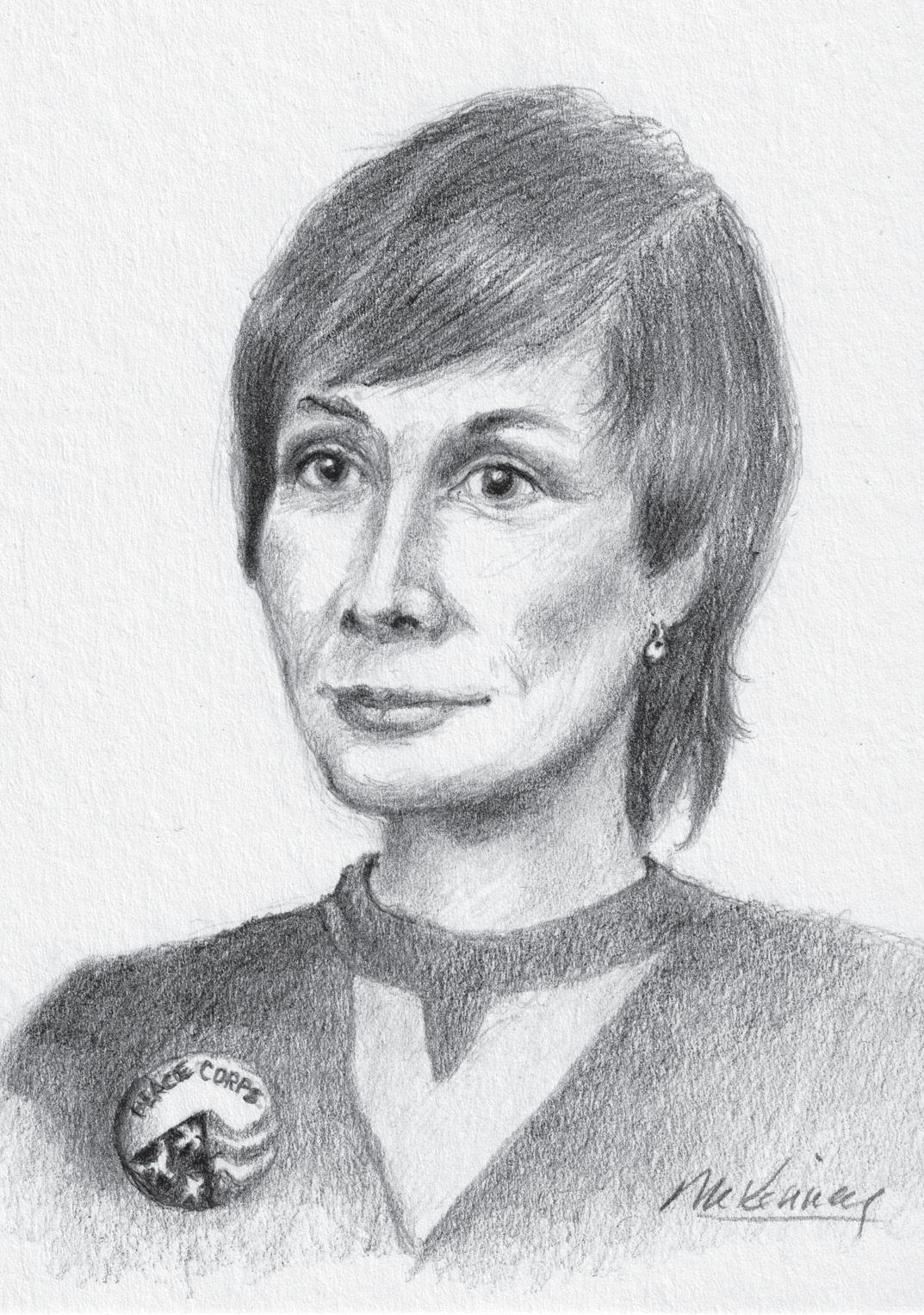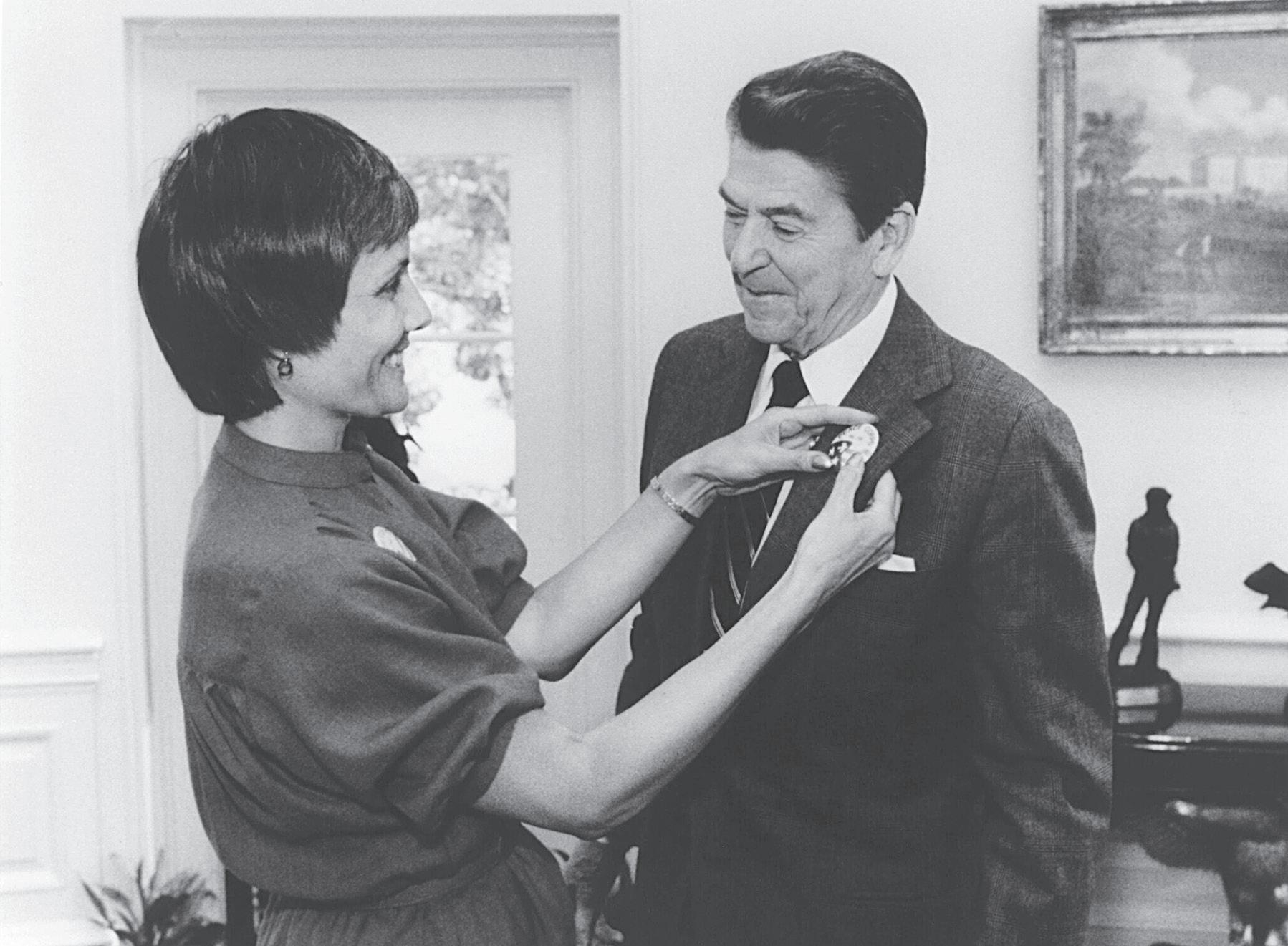
5 minute read
Back Then Larry Chabot
A Yooper to the rescue
Story by Larry Chabot
Advertisement
Sketch by Mike McKinney
“The Heiress Who Saved The Peace Corps.” That’s how the prestigious New York Times described the late Loret Ruppe, a U.P. resident with worldwide influence.
Loret Miller Ruppe was born in Milwaukee in 1936. Her great-grandfather, Frederick Miller, founded the Miller Brewing Company, and her father – also named Frederick – headed the company for many years. He was an All-American football player and team captain at Notre Dame and later served as a volunteer, unpaid coach for Notre Dame and the Green Bay Packers. Rev. Theodore Hesburgh, Notre Dame’s president, said that Miller was the only volunteer coach the school ever had. Miller, age 48 and the father of eight, his 20-year-old son Fred Jr., and two brothers who were Miller pilots, died in a plane crash in Milwaukee in 1954. Over 3,000 people attended the funeral. Loret, only 18 at the time, left Marymount college in New York after the funeral to help her mother. Years later, she was invited back to the school to receive an honorary degree for her many achievements.
In 1957, Loret married Phil Ruppe, one-time president of the Bosch Brewery, moved to Houghton where she raised five daughters and was active in United Way and the hospital guild. According to the Escanaba Daily Press, she was longtime resident and civic leader in Houghton, where the Ruppes had an apartment on Douglass Avenue.
In 1966, her husband was elected to the first of six terms in the U.S. Congress. Loret was active in his campaigns, later serving as Michigan campaign manager of George H.W. Bush’s primary campaign and was busy in the Reagan-Bush campaign that year. She was a member of the Electoral College, which formally certifies a president’s election. While in Washington as a Congressional wife, Loret was president of a club for wives of congressmen, government officials, and foreign diplomats.
As a Republican and frequent world traveler, in addition to having two sisters and a cousin serving overseas, Loret was an ideal candidate for a position in the incoming Reagan administration. So on Feb. 15, 1980, President Reagan selected her as director of the Peace Corps, a Unit-
ed States government program to provide technical assistance, helped Americans better understand cultures, and help others better understand American culture. While awaiting Senate confirmation, she served as a volunteer in the corps. After unanimous approval by the U.S. Senate, she was sworn in by Vice President George H.W. Bush with her husband Phil holding the Bible.
When visiting the White House to meet with Reagan, she was made to wait 45 minutes before the president’s Peace Corps liaison let her in. He startled Loret by telling her that he didn’t believe in the corps and that he wanted to see it abolished. Loret would be seeking another liaison. Once in office, she promised to keep the corps non-partisan, and said that “it must always signify Americans pulling together for peace.”
In early 1985, Loret made a plea on national television for 600 volunteers for what was a shrinking base of workers for African duty, Her plea resulted in more than 7,000 people contacting the agency, enabling her to serve seven more countries. She herself visited over 60 countries across the world to check on progress. When he saw her in action, R. Sargent Shriver, first director of the Peace Corps under President Kennedy (his brother-in-law), said “Without her, the agency would have been ‘blown out of existence.’’
Some referred to her as the corps’ “greatest director.’’
She was the longest-serving director in the agency’s history, and according to the The New York Times, she restored much of its initial vitality. Its volunteer force,

A sketch of Loret Ruppe as director of the Peace Corps.
once as high was 15,000 members, had shrunk to 5,000 people and a smaller budget as it went through seven directors in the seven directors in the previous ten years. She brought in candidates who knew forestry, wildlife management, and sanitation systems. She also began working directly with colleges and universities.
It wasn’t all pain-free. Ruppe took hits from several sources over her decisions. The Washington Post noted that she had been “belted around” in a campaign of character assassination. One complaint was that she kept on for 10 months a former official who was trashing the president. And she was called “an uppity woman, making trouble instead of staying home and helping her husband in his campaign for the Senate.”
After eight years at the agency, Ruppe was named U.S. ambassador to Norway by President George H. W. Bush and served for four years. The Ruppes and Bushes were also social friends. A unique honor was bestowed on her in 1985 when she was named a Michiganian of the Year along with Michigan football coach Bo Schembechler and Detroit Piston star Isaiah Thomas. Another unusual and firsttime occasion was when her daughter Loret, Jr., served the corps in Nepal as a bridge engineer.
As for her credentials as a U.P. woman, Loret had married a Yooper and moved to Houghton with him. She was also a frequent camper at the family lodge on Craig Lake in Baraga County. The family would fly into Marquette County Airport and travel by car to the site. Now Craig Lake State Park, and the most remote park in Michigan. It held six lakes, three of which were named for Miller children Craig, Teddy, and Clair. Another lake was named High Life in recognition of one of Miller Brewing’s most popular beers. The cabins built by the Millers are still in use by the state.
On August 7, 1996, Loret Ruppe died of ovarian cancer, survived by her husband and five daughters. Senator Chris Dodd, a former corps volunteer in the Dominican Republic, paid tribute to her on the Senate floor. Several universities, including Michigan Technological University, granted her honorary degrees or endowed scholarships in her name. The Peace Corps is one of the organizations with such an award.
Her successor, Mark Gearan, summed it up with this eulogy: “The entire Peace Corps family mourns the loss of Loret Ruppe, who was the driving force behind the agency’s revitalization.” Thus she is known as the heiress who saved the Peace Corps.
About the author: Larry Chabot, an Ontonagon native, worked his way through Georgetown University and was then employed at White Pine Copper Company for 32 years, before moving to Marquette with his wife, Betty. He is a freelance writer who has written for several publications, includingover150articlesforMarquette Monthly.
MM

Peace Corps Director Loret Miller Ruppe pins a Peace Corps pin on President Ronald Reagan’s lapel at a meeting in the Oval Office in 1981. (Photo by Jack Kightlinger, Wikimedia Commons)













